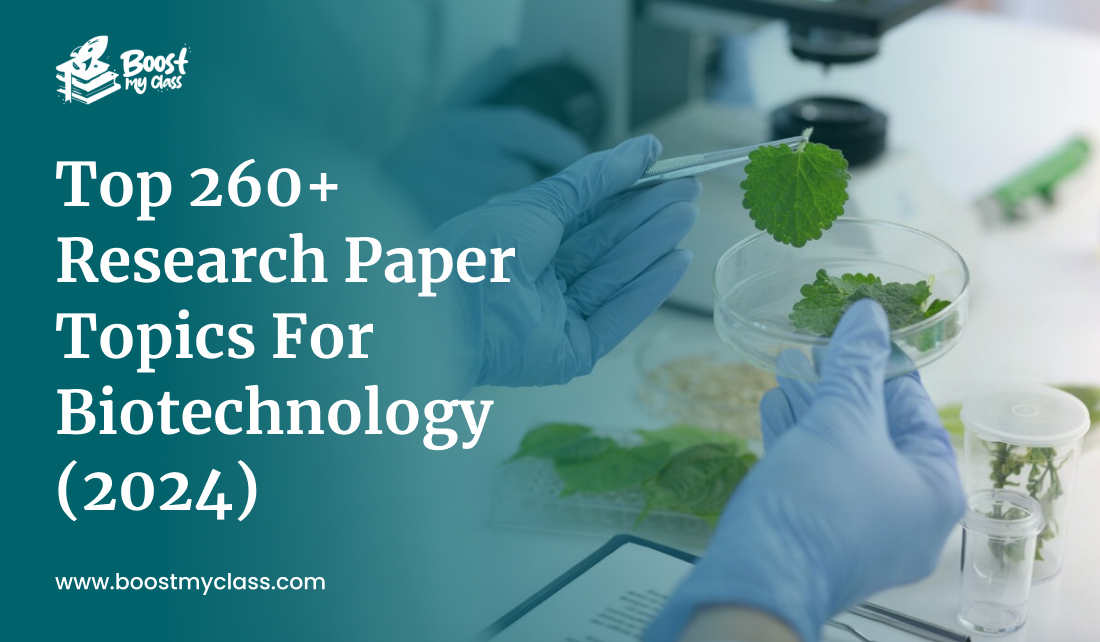Top 260+ Research Paper Topics For Biotechnology (2024)

In the evolving Field of Biotechnology, Finding innovative research papers and dissertation topics for Biotechnology is always challenging. In this article, I have provided a complete list of Research Paper topics for Biotechnology related to advancements in healthcare, agriculture, and beyond. This research paper’s topics include various subjects linked with Biotechnology,
- Agriculture,
- Medicine,
- Industrial
- Molecular Biology
- Waste Management,
- Nanobiotechnology,
- Genetic engineering
- Biopharmaceuticals Synthetic Biology
- Environmental Applications.
- And Many more.
Let’s look at the complete list of the latest Research Paper Topics for 2024.
Key Takeaway
- New Methodologies and Advancements in Biotechnology Mentioned
- Topics about Animal BioTechnology for Farming and Other Purposes
- Topics about the Role of Biotechnology in Waste Management
- Advancement of Biotechnology in the Medical Field.
- Topics about Properties and Usage in Pharmacogenomics
- Topics about Emerging Trends and Technologies in Biotechnology
Table of Contents
Research Paper Topics For Biotechnology in Agriculture
Plant Biotechnology:
- Developing crop varieties resistant to pests, diseases, and abiotic stresses like drought and salinity.
- Improving the nutritional quality of food crops.
- Developing crops that produce biofuels and other industrial products.
- Using plants to produce therapeutic proteins and other pharmaceuticals.
Animal Biotechnology:
- Developing livestock breeds that are more productive and disease-resistant.
- Improving the nutritional quality of meat, milk, and eggs.
- Developing animals that produce therapeutic proteins and other pharmaceuticals.
Agricultural Biotechnology and the Environment:
- Developing crops and livestock that have a reduced environmental impact.
- Using biotechnology to clean up agricultural pollution.
- Developing biopesticides and other biological control methods for pests and diseases.

Agricultural Biotechnology and Society:
- The social, economic, and ethical implications of agricultural biotechnology.
- The role of agricultural biotechnology in food security and sustainable agriculture.
- Public perceptions of agricultural biotechnology.
Chemical Biotechnology in Agriculture
- Use of chemical principles and processes to develop and improve agricultural products and processes
- Ethical, legal, and social implications of chemical biotechnology in agriculture
- Environmental impact of chemical biotechnology
- Intellectual property rights in chemical biotechnology
- Public engagement and communication in chemical biotechnology
- Examples of chemical biotechnology in agriculture
- Potential benefits of chemical biotechnology in agriculture
- Potential challenges of chemical biotechnology in agriculture
Genetically Modified Crops
- Importance of Genetically Modified Crops for Food Security
- Benefits of Genetically Modified Crops
- Genetic Modification for Crop Improvement
Precision Agriculture Techniques
- Data Collection in Precision Agriculture
- Environmental Benefits of Precision Agriculture
Sustainable Pest and Disease Management
- Principles of Sustainable Pest and Disease Management
- Benefits of SPDM for Crop Yield and Quality
- Environmental and Soil Health Benefits by SPDM
Biotechnological Approaches to Pest Control
- Diverse Applications of Biotechnology in Pest Management
- Effectiveness and Environmental Friendliness
- Biotechnological Pest Control Methods
Disease-Resistant Plant Varieties
- Development of Disease-Resistant Crop Varieties
- Benefits of Disease-Resistant Varieties
- Methods of Developing Disease Resistance
Soil Biotechnology
- Application of Chitosan in Agriculture: Bio-Based Solutions for Crop Protection and Soil Improvement
- Basic Study of Soil Biotechnology
- Benefits of Soil Biotechnology
- Impacts of Soil Biotechnology on Agriculture
- Applications of Microbial Biodegradation in Sustainable Agriculture and Soil Health
Soil Microbiome and Crop Productivity
- Crucial Role of the Soil Microbiome
- Advance Research on the Soil Microbiome for 2024
Bioremediation in Agriculture
- Benefits of Bioremediation for Agriculture
- Application in Soil Cleanup
Research Paper Topics For Medical Biotechnology
Biopharmaceuticals and Medicine in Biotechnology
- Definition and Characteristics of Biopharmaceuticals
- Role of Biotechnology in Medicine
- Reverse Vaccinology vs Conventional
- Threats by Antimicrobial resistance

Biopharmaceutical Production
- Analytical Method Validation in Biopharmaceuticals: Best Practices and Challenges
- Biosimilars and Biobetters: Regulatory Landscape and Market Implications
- Automation and Process Analytical Technology (PAT) in Pharmaceutical Manufacturing
- Vaccine Development and Manufacturing: Current Trends and Future Prospects
- Environmental Impact of Single-Use Manufacturing Systems in Biopharmaceuticals
Bioreactor Technology
- Advancements in Bioreactor Technology
- Application of Bioreactors in Biopharmaceuticals
- Bioreactor Technology for Biodegradation of Environmental Pollutants
- The Role of Single-Use Bioreactors in Flexible Bioprocessing
Monoclonal Antibodies
- Types of Cancer Vaccines: Peptide-Based, Dendritic Cell-Based, and RNA Vaccines
- Exploring the Potential of Monoclonal Antibodies in the Treatment of Diseases
- Enhancing Monoclonal Antibodies: Engineering and Optimization Strategies
- Evaluating Monoclonal Antibodies In Vitro and In Vivo
- Exploring Fc-Mediated Functions of Monoclonal Antibodies
- Innovations in DNA and mRNA-Based Platforms for Monoclonal Antibodies
- Enhancing Monoclonal Antibodies through Effector Cell Engagement
- Advancements in Broadly Neutralizing Monoclonal Antibodies
- Distinguishing Viral-Dependent and Host-Dependent Monoclonal Antibodies
- Comprehensive Structural and Functional Analyses of Monoclonal Antibodies
Gene Therapy and Personalized Medicine
- Development of new gene therapy vectors and delivery systems
- Clinical trials of gene therapy for various diseases
- Ethical, legal, and social implications of gene therapy and personalized medicine
CRISPR-Cas9 and Gene Editing
- Development of new CRISPR-Cas9 systems and tools
- Applications of CRISPR-Cas9 in basic and translational research
- Ethical, legal, and social implications of CRISPR-Cas9 gene editing
Pharmacogenomics
- Pharmacogenomic Variability in Drug Metabolism: Implications for Dosage Adjustments
- Personalized Medicine and Pharmacogenomics: Tailoring Treatments to Individual Genomes
- Genetic testing for drug response
- Development of personalized medicine approaches
- Ethical, legal, and social implications of pharmacogenomics
Immune Checkpoint Inhibitors
- Mechanisms of action of immune checkpoint inhibitors
- Clinical trials of immune checkpoint inhibitors for various cancers
- Resistance to immune checkpoint inhibitors
Research Paper Topics For Environmental Biotechnology
Bioremediation and Pollution Control
- Use of microbes and enzymes to clean up pollutants
- Development of new bioremediation strategies
- Environmental impact of bioremediation
Microbial Biodegradation
- Explore the role of microbes in breaking down pollutants.
- Microbial Bioreactors for Industrial Enzyme Production
- Biodegradation of Emerging Contaminants by Microbial Communities in Wastewater Treatment Plants
- Microbial Biodegradation of Xenobiotics and Endocrine-Disrupting Compounds in Soil and Water
- Microbial Biodegradation of Hydrocarbons in Marine Environments: Ecological and Industrial Aspects
- Microbial Biodegradation and Bioconversion of Agricultural and Food Wastes for Sustainable Bioproducts
- The Role of Genomic and Metagenomic Approaches in Studying Microbial Biodegradation Pathways
- Microbial Interactions in Marine Fungi Communities: Roles of Bacteria and Viruses
Phytoremediation
- Phytoremediation: Harnessing Plant-Based Solutions for Environmental Cleanup
- Case Studies of Phytoremediation Success: Lessons Learned from Remediated Sites
- Enhancing Phytoremediation Performance through Genetic Modification of Plants
- Phytoremediation in Mining and Industrial Wastelands: Sustainable Remediation Practices
- The Role of Rhizosphere Microorganisms in Enhancing Phytoremediation Efficiency
- Phytoremediation and Climate Change Mitigation: Sequestering Carbon in Contaminated Soils
Waste Management and Resource Recovery
- Biotechnological Strategies for Efficient Municipal Solid Waste Management
- Bioconversion of Organic Waste into Biofuels and Value-Added Chemicals
- Microbial Communities in Bioreactors for Waste-to-Energy Conversion: Diversity and Stability
- Bioremediation of Hazardous Waste Sites: Harnessing the Power of Microorganisms
- Resource Recovery from Landfill Leachate using Microbial Consortia
Biogas Production from Organic Waste
- Biogas Safety Measures and Monitoring in Biogas Plants
- Life Cycle Assessment of Biogas Production from Various Organic Feedstocks
- Biogas in Circular Economy: Bridging Organic Waste Management and Energy Generation
- Biogas Safety Measures and Monitoring in Biogas Plants
Biodiversity Conservation
- The Role of Biodiversity in Natural Product Discovery for Biotechnology
- Biotechnology and the Preservation of Endangered Species: Tools and Techniques
- Biotechnology and Ecotourism: Balancing Economic Growth and Biodiversity Protection
- Marine Biodiversity and Biotechnology: Potential for Drug Discovery and Sustainable Resources
- Biodiversity Conservation and the Biotechnology Industry: Synergies and Conflicts
- The Role of Botanical Gardens and Seed Banks in Biodiversity Conservation for Biotechnology
Cryopreservation Of Endangered Species
- Evaluating the Viability of Cryopreserved Tissues and Cells: A Bridge Between Research and Conservation
- Cryopreservation in Ex Situ Conservation: Creating Frozen Arks for Endangered Species
- The Use of Cryopreserved Genetic Material in Assisted Reproduction for Endangered Species
- Transboundary Collaboration in Cryopreservation for International Species Conservation
- The Cryopreservation of Pollinators and Their Role in Ecosystem Restoration
Genetic Diversity Assessment
- Advancements in Genomic Technologies for Assessing Genetic Diversity
- Adaptive Genetic Diversity in Response to Environmental Changes: Biotechnological Perspectives
- Biotechnology and Genetic Diversity Assessment in Aquatic Ecosystems
- Microsatellite and SNP Markers for Genetic Diversity Analysis: Comparative Studies
- Education and Public Awareness on the Importance of Genetic Diversity for Biotechnology and Conservation
Research Paper Topics For Industrial Biotechnology

Biofuels and Renewable Energy
- Development of new biofuel crops and production processes
- Life cycle assessment of biofuels
- Economic and policy considerations for biofuels
- Sustainable Aviation Biofuels: Biotechnological Pathways and Challenges
- Biofuels and the Circular Bioeconomy: Waste-to-Energy and Resource Recovery
- Techno-Economic Assessment of Biotechnological Approaches to Biofuel Production
- Challenges and Opportunities in Synergizing Biofuel, Renewable Energy, and Oil Spill Mitigation
Bioethanol Production
- Market Dynamics and Policy Frameworks Affecting Bioethanol Production and Biotechnology Research
- The Role of Microbial Consortia in Bioethanol Production from Complex Substrates
- Biotechnology in Co-Fermentation Processes for Enhanced Bioethanol Yields
- Bioethanol and Energy Security: A Biotechnological Approach to Reduce Reliance on Fossil Fuels
- Biotechnological Approaches to Increase Bioethanol Production in Developing Countries
Algal Biofuels
- Advancements in Algal Biotechnology for Biofuel Production
- Biotechnological Advances in Algal-Based Biohydrogen Production
- Microalgal Biotechnology for Producing High-Value Biochemicals in Addition to Biofuels
- Biorefineries and Integrated Algal Biotechnology for Multiple Product Streams
- Algal Biofuels and Sustainable Agriculture: Biotechnological Synergies
Biocatalysis and Enzyme Engineering
- Enzyme Engineering for Enhanced Biocatalytic Activity and Stability
- Immobilization Techniques for Enzyme Stabilization and Reusability in Biocatalysis
- Biocatalysis in the Food Industry: Enzyme Engineering for Healthier Products
- Biocatalysis in the Production of Fine and Specialty Chemicals: Current Status and Future Prospects
- Biocatalysis and Enzyme Engineering for Sustainable Textile Processing
- Regulatory and Ethical Aspects in the Use of Engineered Enzymes in Biotechnology
- Recombinant DNA Technology: Principles and Applications in Biotechnology
Enzymes in Industrial Processes
- Industrial Enzymes: Catalysts for Sustainable Bioprocessing
- Biotechnological Insights into Enzymatic Detergent Formulations
- Enzymes for Sustainable Mining and Metal Recovery
- Enzymatic Pulp and Paper Processing: Innovations and Sustainability
- Enzymes in Biotechnology for Environmental Pollutant Degradation
Metabolic Engineering
- The Role of Synthetic Biology in Metabolic Engineering for Industrial Bioprocessing
- Metabolic Pathway Optimization in Industrial Microbes for Enhanced Productivity
- Biotechnological Approaches to Improve Metabolic Flux Analysis in Engineered Organisms
- Applications of metabolic engineering in industry and medicine
- Ethical, legal, and social implications of metabolic engineering
Bioplastics and Sustainable Materials
- Bioplastics in the Circular Economy: Sustainable Solutions for Reducing Plastic Pollution
- Bioplastic Blends and Composites: Enhancing Performance and Sustainability
- Biotechnological Approaches to Enzymatic Degradation of Bioplastics
- Biotechnology and Genetic Engineering of Microbes for Bioplastic Synthesis
- Development of new bioplastics and biocomposites
- Production and processing of bioplastics
- Life cycle assessment and environmental impact of bioplastics
Biodegradable Polymers
- Biodegradable Polymers in Tissue Engineering and Regenerative Medicine: Biotechnological Applications
- Biodegradable Polymer Matrices for Controlled Drug Delivery: Biotechnology and Innovations
- Enzymatic Degradation of Biodegradable Polymers: Mechanisms and Biotechnological Insights
- Biodegradable Polymer Blends and Composites: Properties, Processing, and Sustainability
- Biodegradable Polymers and Marine Pollution: Mitigating Microplastic Contamination
- Biodegradable Polymers and Circular Economy: Sustainable Material Flows and Biotechnological Perspectives
Bio-Based Materials
- Biotechnological Advancements in the Production of Bio-Based Polymers
- Bio-Based Materials for Packaging and Preservation of Food: Quality and Safety Aspects
- Bio-Based Materials and Regulations: Standards, Labeling, and Certification
- Biotechnological Insights into the Utilization of Agricultural Residues for Bio-Based Materials
- Bio-Based Composite Materials: Blending Natural Resources for Enhanced Performance
Biotechnology and Human Health
- The Role of Biotechnology in Genetic Testing and Genomic Medicine
- Biotechnological Approaches to Cancer Therapy: Targeted Therapies and Immunotherapy
- Biotechnology and Precision Medicine: Shaping the Future of Healthcare
- Biotechnological Innovations in Disease Surveillance and Epidemiology
- Biotechnology and the Global Health Agenda: Addressing Health Disparities
- Biotechnology and Drug Discovery: Accelerating the Development of New Pharmaceuticals”
Diagnosis and Disease Monitoring
- Remote Sensing Technologies and Their Applications in Disease Monitoring
- Biotechnological Challenges in Disease Diagnosis and Monitoring in Resource-Limited Settings
- Ethical and Regulatory Considerations in Disease Diagnosis and Monitoring Technologies
- Monitoring through Continuous Glucose Monitoring in Diabetes Care: Pros and Cons
- Microfluidic Devices for Disease Diagnosis and Monitoring in Resource-Limited Settings
- Wearable Devices for Disease Monitoring and Personalized Healthcare
Liquid Biopsies
- Biotechnological Challenges in Liquid Biopsies: Standardization and Validation
- Liquid Biopsies for Monitoring Transplant Rejection: Advances and Future Directions
- Public Awareness and Education on the Role of Liquid Biopsies in Healthcare
- Ethical and Privacy Considerations in Liquid Biopsy Research and Clinical Practice
- The Role of Circulating Tumor Cells in Liquid Biopsies for Cancer Diagnosis
- Liquid Biopsies for Monitoring Cancer Treatment Response and Resistance
Tissue Engineering and Regenerative Medicine
- Tissue Engineering in Dentistry: Applications in Oral and Maxillofacial Reconstruction
- Biotechnology and Biofabrication Techniques for Engineered Tissues
- Tissue Engineering for Urological Applications: Bladder and Kidney Regeneration
- Development of new biomaterials and scaffolds
- Clinical trials of tissue engineering and regenerative medicine therapies
- Tissue Engineering and Regenerative Medicine for Rare and Orphan Diseases
3D Bioprinting
- Biotechnology and 3D Bioprinting: Advances in Tissue and Organ Fabrication
- Materials for 3D Bioprinting: Biotechnological Advances and Challenges
- Biotechnological Approaches to Creating Functional Liver Tissues via 3D Bioprinting
- Bioprinting Neural Tissues: Advances in 3D Printing of Brain and Spinal Cord Models
- 3D Bioprinting in Dentistry: Customized Dental Implants and Tissues
- 3D Bioprinting For Space Sciences: Challenges and Opportunities for Long-Duration Missions
- Bioprinted Skin Tissues for Wound Healing and Cosmetic Testing
Stem Cells Therapy
- Biotechnological Advancement in Stem Cell-Based Therapies for Neurological Disorders
- Stem Cell Therapy for Autoimmune Diseases
- Biotechnology and Stem Cells Therapy in Ophthalmology: Vision Restoration and Beyond
- Stem Cell Therapy for Lung and Respiratory Diseases: Biotechnological Progress
- Public Awareness and Education on the Potential of Stem Cell Therapy in Healthcare
- Ethical and Regulatory Considerations in Stem Cell Therapy Research
- Biotechnology and Induced Pluripotent Stem Cells (iPSCs) in Regenerative Medicine
AI and Machine Learning in Biotechnology
- Biotechnology and AI in the Development of Next-Generation Vaccines
- AI-Enhanced Biotechnology in Agriculture: Precision Farming and Crop Improvement
- Deep Learning and Computer Vision in Biotechnology: Image Analysis and Diagnosis
- AI-Driven Genomic Analysis for Personalized Medicine: Transforming Healthcare
- Use of AI and machine learning to identify new drug targets and design new drugs
- Development of new drug discovery pipelines that incorporate AI and machine learning
- Ethical, legal, and social implications of AI and machine learning in drug design
Need assistance with your Online Biology Class? Simply reach out to us.
150+ ![]()
Qualified Tutors
Research Paper Topics For Ethical, Legal, and Social Issues (ELSI) in Biotechnology
Biotechnology And Ethical Concerns
- Biotechnology and Ethical Education: Promoting Responsible Innovation
- Ethical and Cultural Perspectives on Biotechnology: A Comparative Analysis
- Ethical Considerations in Clinical Trials and Human Research in Biotechnology
- Ethical implications of human gene editing
- Intellectual property rights in biotechnology
- Public engagement and communication in biotechnology
- Biotechnology, Access to Healthcare, and Global Health Disparities: Ethical Challenges
Cloning And Bioethics
- Ethical Considerations in Therapeutic Cloning for Regenerative Medicine
- Cloning for Research and Medical Applications: Ethical Frameworks and Guidelines
- Ethical Considerations in Human Organ Cloning for Transplantation
- The Role of International Agreements and Bioethics in Cloning Regulation
- Bioethics and the Cloning of Non-Human Primates: Ethical Challenges
- Bioethical Deliberations on the Future of Cloning and Human Society
Regulation And Intellectual Property
- Public Awareness and Education on Intellectual Property Issues in Biotechnology
- Biotechnology, CRISPR-Cas9, and the Patent Landscape: Legal Conflicts and Resolutions
- Regulatory Harmonization and the Global Intellectual Property Landscape in Biotechnology
- Biotechnology Startups and Intellectual Property Management: Strategies for Success
- Regulatory and Intellectual Property Challenges in Gene Editing Technologies
- Biotechnology and Data Privacy: Regulatory Challenges and Intellectual Property Implications
Patenting Genes and Organisms
- Biotechnology and the Controversy Surrounding the Patenting of Human Genes
- Ethical Dilemmas in Patenting Natural Genes: Balancing Innovation and Access
- Patenting Organisms and Their Genetic Modifications: Regulatory Frameworks and Implications
- Biotechnology and Patenting Microorganisms: From Engineered Strains to Microbial Factories
- Regulation and Patenting of Genetically Modified Living Organisms in Agriculture and the Environment
- Public Awareness and Education on Gene and Organism Patents: Informed Debate and Decision-Making
Biotechnology And Society
- Public Perception and Acceptance of Biotechnology: Factors and Influences
- Bioethics and Human Enhancement: Implications for Society and Social Equity
- Economic and Cultural Impacts of Biotechnology on Indigenous Communities
- Biotechnology and Global Health: Addressing Health Disparities and Access to Care
- Biotechnology in Medicine: Access, Affordability, and Societal Health Outcomes
- Biotechnology, Genetic Engineering, and Ethical Concerns in Food Labeling and Transparency
Social Implications Of Genetic Testing
- Social Implications of Genetic Testing in Precision Medicine Initiatives
- Public Engagement and Education on Genetic Testing: Bridging Gaps in Awareness and Understanding
- Genetic Testing and Long-Term Healthcare Costs: Economic and Societal Implications
- Genetic Testing and Familial Dynamics: Exploring the Impacts on Relationships and Communication
- Ethical Considerations in Direct-to-Consumer Genetic Testing: Balancing Autonomy and Informed Decision-Making
- Genetic Testing and Personalized Medicine: Societal Impact and Healthcare Transformation
Need assistance with your Online Biology Exam? Simply reach out to us.
150+ ![]()
Qualified Tutors
Research Paper Topics For Emerging Technologies In Biotechnology
Nanobiotechnology
- Nanomedicine and Targeted Drug Delivery: Innovations in Cancer Therapy
- Nanobiotechnology and its Applications in Medicine and Healthcare
- Nanobiotechnology in Personalized Medicine: Tailoring Treatments to Individual Needs
- Nanoparticles in Agriculture: Sustainable Approaches to Crop Enhancement
- Biosensors and Nanobiotechnology: Revolutionizing Diagnostics and Monitoring
- Nanoparticle-Based Vaccines: Enhancing Immunization and Protection
Synthetic Biology
- Biotechnological Applications of Synthetic Biology: Engineering Living Systems for Specific Functions
- Biological Computing and Information Storage in Synthetic Biology
- Public Perception and Education on Synthetic Biology: Fostering Understanding and Informed Debate
- Applications of synthetic biology in medicine, industry, and environmental engineering
- Ethical, legal, and social implications of synthetic biology
Bioinformatics and Omics Data Analysis for Biotechnology
- Metagenomics: Unraveling Microbial Communities and Functions in Complex Environments
- Advances in Next-Generation Sequencing: Challenges and Opportunities in Omics Data Analysis
- Genome-Wide Association Studies (GWAS) in Biotechnology: Omics Approaches to Identifying Disease Markers
- Metabolomics in Biotechnology: Profiling Small Molecules for Diagnostic and Therapeutic Insights
- Multi-Omics Data Visualization and Integration Tools: A Comprehensive Overview
- Biotechnology and Ethical Considerations in Omics Data Sharing and Privacy
- Phylogenomics: Unraveling Evolutionary Relationships through Genome Analysis
- Bioinformatics in Clinical Genomics: From Variant Analysis to Personalized Medicine
- Data Integration in Systems Biology: Connecting Multiple Omics Datasets for Holistic Insight
Research Paper Topics For Molecular Biology
DNA & RNA Studies
- DNA Sequencing Technologies: Advances and Applications in Molecular Biology
- Molecular Biology of Cancer: Genomic Insights and Therapeutic Targets
- Molecular Diagnostics in Medicine: From Biomarker Discovery to Clinical Applications
- MicroRNA (miRNA) Biology and Function: Regulatory Roles in Health and Disease
- PacBio Sequencing Technology: Advances in Long-Read DNA Sequencing
Immunology
- Immunology in Transplantation: Organ Rejection and Immunosuppressive Strategies”
- Immunology and Gut Microbiome: The Gut-Immune Axis and Its Health Implications”
- Immunology and the Microbiota-Brain Connection: Understanding the Gut-Brain Axis
FAQs
1. What is the significance of research paper topics in biotechnology?
Research paper topics in biotechnology play a pivotal role in advancing knowledge and driving innovation in a field with vast potential. Choosing the right topic ensures that your research is relevant, impactful, and contributes to the field’s development.
2. Are there any controversial topics in biotechnology research?
Biotechnology encompasses controversial topics like GMOs, cloning, and gene editing. These topics offer unique opportunities for exploration, but they also come with ethical and societal considerations.
3. How can I ensure the uniqueness of my research paper in biotechnology?
A: To make your research paper unique, focus on original research questions, in-depth analysis, and a fresh perspective. Cite relevant sources and adhere to proper citation practices.
4. Can I explore interdisciplinary research in biotechnology?
Absolutely. Biotechnology often intersects with other fields like chemistry, environmental, and computer science. Interdisciplinary research can lead to groundbreaking discoveries.
5. What are some reliable sources for biotechnology research?
A: Trusted sources include academic journals, government publications, and reputable scientific organizations. These sources provide peer-reviewed research and up-to-date information.
6. How can I make my biotechnology research paper engaging for readers?
Use clear and concise language, real-world examples, and relatable analogies to engage your readers. Ensure your paper is well-organized and addresses real-world challenges.
Conclusion
In Conclusion, Biotechnology is an ever-changing field; you must keep updated on better topics. Research paper topics in biotechnology are the key to unlocking the potential of this dynamic field. By choosing a compelling and relevant topic, you embark on a journey that can lead to groundbreaking discoveries and meaningful contributions to science and society.
I am a Healthcare professional and passionate about Nursing and Human Psychology. Finished more than 502+ online classes and exams for the students. I am facilitating high achievement with minimal stress!
Discount
On Your First Order




